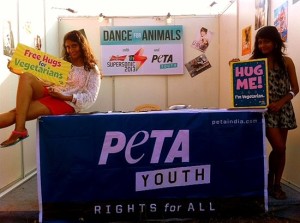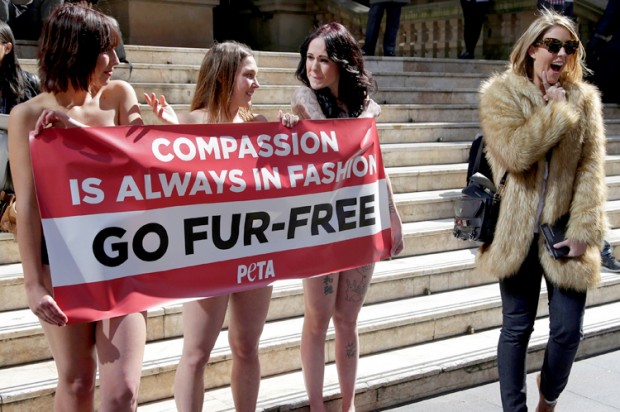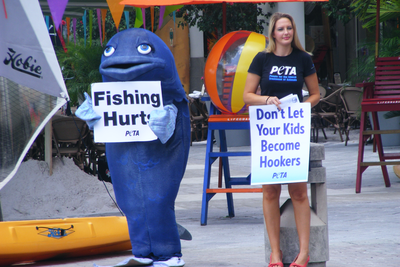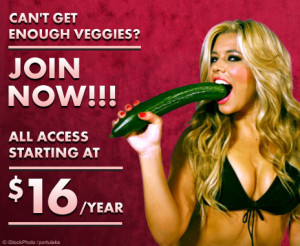PBS is currently streaming an amazing documentary on sex trafficking in the United States called, A Path Appears. The statistics are sobering. While most Americans believe prostitution to be a “choice” and a “victimless crime,” the truth is that these women (primarily poor women and women of color) are surviving severe emotional trauma and child abuse (usually sexual). Prostitution is the revictimization of the most vulnerable. As with the consumption of Nonhuman Animal suffering (“meat,” dairy, rodeos, zoos, “pets,” etc.), it is simply easier to view this relationship of dominance and destruction as a mutually beneficial one built on consent. But that is far from the case. Prostitution is for all intents and purposes sex trafficking.
In my vegan feminist work, I am frequently critical of how women’s bodies are also degraded within the Nonhuman Animal rights movement to sell organizations, to sell veganism, or to sell vegan products. Women’s bodies are bought and sold for someone else’s gain, but we too often take the “live and let live” path and presume that women are engaging in these behaviors purely out of “choice” and that it’s “victimless” or just “harmless antics.” The degradation of women’s bodies should be our business and we should not look away because this is not simply a matter of personal choice. Powerful gender roles and a culture of sexism provide specific opportunities for women, and these opportunities are unevenly distributed. The research is so desperately clear that the sexual objectification and degradation of women’s bodies is linked to actual, physical harm to women as a group, but vulnerable women in particular. White women of means may have the privilege of some degree of agency when getting naked to pass out Tofutti deserts for PETA or flyers for LUSH, but real women in our communities are being hurt by the ideology of misogyny that is upheld by the notion that women’s bodies are commodities.
Readers are often flabbergasted to learn that LUSH engages the sexual objectification of women, and, while many stubbornly defend the company, others ask what other alternatives might be available. The truth is that LUSH is not even a vegan company. Many 100% vegan companies exist that produce body products in a way that respects women and other animals alike. Of course, we do not always have access to 100% vegan companies and some of us like to support the vegan options made available by vegan-friendly companies to encourage the growth of veganism. I was actually quite thrilled to learn that the non-profit featured on A Path Appears that saves and supports women and girls who have survived the sex trade also employs these women and funds the non-profit’s services with an animal-friendly bath and body business. They report on their website that almost everything they produce is vegan (except for some products that contain beeswax and lanolin and are products of violence) and no products are tested on Nonhuman Animals.
Veganism should not end with compassion and justice for Nonhuman Animals alone. If women or any other vulnerable group is being hurt by your consumption, it should also be questioned. I highly recommend this documentary and I hope that you will (after suitably preparing yourself for this potentially triggering material) watch, learn, and expand your activist imagination. The next time you consider purchasing from LUSH, reconsider. Take a peek at Thistle Farms instead. We must understand oppression in terms of intersectionality, because all of these issues are entangled.
Film expires February 17, 2015. Streaming free online through PBS to American viewers. For viewers outside the U.S., try Hola, a free browser add-on.
 Dr. Wrenn is Lecturer of Sociology. She received her Ph.D. in Sociology with Colorado State University in 2016. She received her M.S. in Sociology in 2008 and her B.A. in Political Science in 2005, both from Virginia Tech. She was awarded Exemplary Diversity Scholar, 2016 by the University of Michigan’s National Center for Institutional Diversity. She served as council member with the American Sociological Association’s Animals & Society section (2013-2016) and was elected Chair in 2018. She serves as Book Review Editor to Society & Animals and has contributed to the Human-Animal Studies Images and Cinema blogs for the Animals and Society Institute. She has been published in several peer-reviewed academic journals including the Journal of Gender Studies, Feminist Media Studies, Disability & Society, Food, Culture & Society, and Society & Animals. In July 2013, she founded the Vegan Feminist Network, an academic-activist project engaging intersectional social justice praxis. She is the author of A Rational Approach to Animal Rights: Extensions in Abolitionist Theory (Palgrave MacMillan 2016).
Dr. Wrenn is Lecturer of Sociology. She received her Ph.D. in Sociology with Colorado State University in 2016. She received her M.S. in Sociology in 2008 and her B.A. in Political Science in 2005, both from Virginia Tech. She was awarded Exemplary Diversity Scholar, 2016 by the University of Michigan’s National Center for Institutional Diversity. She served as council member with the American Sociological Association’s Animals & Society section (2013-2016) and was elected Chair in 2018. She serves as Book Review Editor to Society & Animals and has contributed to the Human-Animal Studies Images and Cinema blogs for the Animals and Society Institute. She has been published in several peer-reviewed academic journals including the Journal of Gender Studies, Feminist Media Studies, Disability & Society, Food, Culture & Society, and Society & Animals. In July 2013, she founded the Vegan Feminist Network, an academic-activist project engaging intersectional social justice praxis. She is the author of A Rational Approach to Animal Rights: Extensions in Abolitionist Theory (Palgrave MacMillan 2016).
Receive research updates straight to your inbox by subscribing to my newsletter.


















